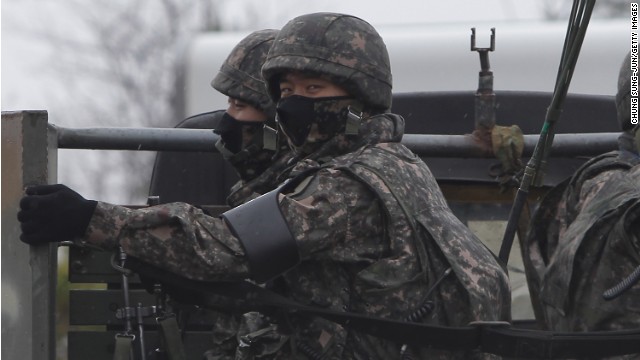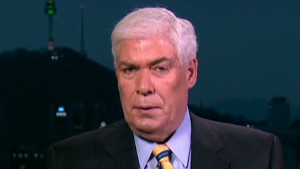Pyongyang to foreigners: Leave S. Korea
STORY HIGHLIGHTS
- British Embassy says it sees no immediate threat in South Korea
- The North says it doesn't want to see foreigners hurt in any war
- Last week, it told diplomats in Pyongyang it couldn't guarantee their safety
- Japan has deployed missile defense systems around Tokyo
(CNN) -- North Korea issued its latest dispatch of ominous rhetoric Tuesday, telling foreigners in South Korea they should take steps to secure shelter or evacuation to protect themselves in the event of a conflict on the Korean Peninsula.
The unnerving message came as Japan set up missile defenses in Tokyo, and North Korean workers failed to turn up for work in the industrial complex jointly operated by North and South Korea.
In the statement published by state-run media Tuesday, the North's Korea Asia-Pacific Peace Committee reiterated accusations that Washington and Seoul were seeking to provoke a war with Pyongyang.
"Once a war is ignited on the peninsula, it will be an all-out war," the committee said, adding that North Korea doesn't want foreigners in South Korea to "fall victim" to a conflict.
It follows a warning from the North last week to diplomats in its capital city, Pyongyang, that if war were to break out, it would not be able to guarantee their safety.
But staff at the British Embassy in Seoul appeared unimpressed by the North's most recent attempt to rattle nerves in the region.
"We are not commenting on the specifics of every piece of rhetoric from North Korea," said Colin Gray, head of media affairs at the embassy. "Our travel advice remains unchanged. At this moment, we see no immediate threat to British citizens in South Korea."
Several Western countries said last week they had no plans to withdraw staff from Pyongyang after the North's warning to diplomats there.
And foreign visitors in Seoul didn't appear to be panicking Tuesday.
"I am concerned, but not enough not to make the trip," said Vicky Polashock, who was visiting from Atlanta.
She said that there was more tension than she'd noticed on previous visits to South Korea, but that the North's latest threat "doesn't heighten the danger any more than the last couple of weeks."
Threat after threat
North Korea has unleashed a torrent of dramatic threats against the United States and South Korea in recent weeks, including that of a possible nuclear strike. But many analysts have cautioned that much of what Kim Jong Un's regime is saying is bluster, noting that it is believed to still be years away from developing an operational nuclear missile.
A more likely scenario, they say, is a localized provocative move.
Amid the fiery words from Pyongyang and annual military training exercises by U.S. and South Korean forces in the region, government officials in Washington and Seoul say they are taking the North Korean threat seriously.
The North was blamed for two attacks on South Korea in 2010 -- one on a navy vessel and another on the island of Yeonpyeong -- that killed 50 people. Pyongyang still denies responsibility for the sinking of the South Korean warship, the Cheonan, in which 46 sailors died.
On Tuesday, Japan said it had deployed missile defense systems around Tokyo amid expectations that the North could carry out a missile test in the coming days.
The Japanese government is making "every possible effort to protect the Japanese people and ensure their safety," said Prime Minister Shinzo Abe.
The Patriot missile batteries were set up in the central Tokyo district of Ichigaya and in the suburbs of Asaka and Narashino, authorities said.
South Korean government officials have said they think North Korea could conduct the test launch of a missile as soon as Wednesday, following reports that the North had loaded as many as two medium-range missiles onto mobile launchers on its east coast.
The United States had previously said it was moving missile defense systems to Guam, a Western Pacific territory that is home to U.S. naval and air bases. North Korea has cited those bases when listing possible targets for missile attacks.
A symbol of cooperation at risk
The souring situation on the Korean Peninsula was in evidence in the failure of more than 50,000 North Korean workers to show up for work Tuesday morning at the Kaesong Industrial Complex, the manufacturing zone shared by the two Koreas that had operated without such an interruption for eight years.
The North had declared Monday that it would pull out its workers and temporarily suspend activities at the complex, which sits on its side of the heavily fortified border but houses the operations of more than 120 South Korean companies.
On Tuesday, the South Korean Unification Ministry said the North Korean workers hadn't reported for work in the district, which is the last major symbol of cooperation between the two Koreas.
Analysts had expressed skepticism that Pyongyang would follow through on previous threats to shut down the complex, noting that it was an important source of hard currency to the regime of Kim Jong Un.
It also likely to put pressure on the city of Kaesong itself, where the North Korean workers and their families live. With an estimated population of between 200,000 and 300,000 people, it is one of the impoverished country's largest cities.
South Korean officials criticized the North's decision to halt activities at Kaesong, with President Park Geun-hye saying Tuesday that it risked damaging its credibility as a place to do business.
Since last week, the North had been blocking South Koreans from entering the zone, depriving the factories of key personnel and supplies. The entry ban had already prompted more than 10 of the companies to cease production.
As of Tuesday, 406 South Koreans and two Chinese remained inside the industrial complex, the South Korean government said.
The North had blocked South Koreans from going into the complex before, in March 2009. But it returned the situation to normal in a matter of days and didn't withdraw its own workers from the factories.
Anger about sanctions
North Korea stepped up its efforts to stir tensions in the region after the U.N. Security Council imposed stricter sanctions for Pyongyang's latest underground nuclear test, which took place in February.
Shows of strength by the U.S. military during the current training exercises with South Korea have provided extra material for the North's verbal broadsides.
The United States has since dialed back its military displays to avoid any further escalation of the crisis. It postponed a missile test scheduled for this week in California to prevent any misreading of the situation by Pyongyang.
But North Korea is sticking to its claim that it needs its own nuclear weapons as a deterrent to the threat it perceives from the United States. And it is demanding to be recognized globally as a nuclear power.
Last week, Pyongyang said it would restart a nuclear reactor that it had shut down five years ago under an agreement with Washington, Seoul, Beijing and other parties.
It has also severed a key military hotline with the South, and said it was ditching the armistice agreement that stopped the Korean War in 1954. Because that war ended in a truce and not a formal peace treaty, the two Koreas technically remain at war.
CNN's K.J. Kwon, Tim Schwarz, Kyung Lah, Judy Kwon, Jim Clancy Yoko Wakatsuki and Junko Ogura contributed to this report.
 WASHINGTON – President Barack Obama reportedly said The U.S. Constitution is out-of-date, so he is ripping it up and writing a new one.
WASHINGTON – President Barack Obama reportedly said The U.S. Constitution is out-of-date, so he is ripping it up and writing a new one. 2) EXECUTIVE FINANCIAL POWER – The President will have the power to unilaterally enact any financial policy he chooses, without approval of Congress. He must inform them, but they can not “stop” the President from promoting his (or her) agenda.
2) EXECUTIVE FINANCIAL POWER – The President will have the power to unilaterally enact any financial policy he chooses, without approval of Congress. He must inform them, but they can not “stop” the President from promoting his (or her) agenda.


 Get used to it. Because he wants it. And he's reaching for it.
Get used to it. Because he wants it. And he's reaching for it.




 A 4-year old boy shot and killed the wife of a Tennessee sheriff's deputy over the weekend, police say.
A 4-year old boy shot and killed the wife of a Tennessee sheriff's deputy over the weekend, police say.
